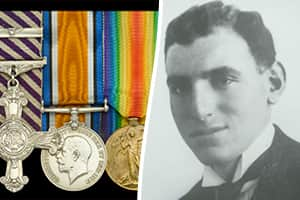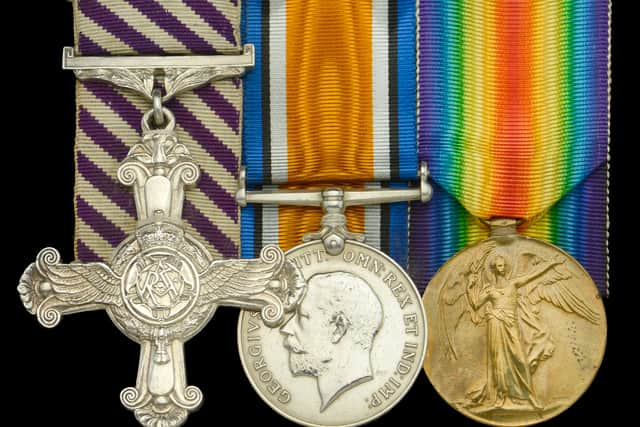Medals of the only Brummie to achieve ‘ace’ status in World War One to go under hammer
and live on Freeview channel 276
A rare set of medals awarded to a Jewish fighter ace of World War One are to go under the hammer.
RAF hero Captain Solomon Clifford Joseph - described as a “gung-ho” flyer - was also the only Brummie to achieve “ace” status in the Great War.
Advertisement
Hide AdAdvertisement
Hide AdThe Sopwith Camel pilot was awarded the Distinguished Flying Cross (DFC) and bar which are expected to fetch between £15,000 and £18,000 when they are sold by a collector at Noonans auction house in London next month.
Mark Quayle, medal specialist and associate director of Noonans, said: “Joseph was a ‘gung-ho’ pilot, whose aggressive flying style and skill accounted for at least 13 aerial victories over the Western Front between May and October 1918.
“He was no stranger to taking risks, and was wounded in aerial combat, and nearly shot down on many occasions.”
Around 66 D.F.C. and Bars were awarded during the First World War.
Advertisement
Hide AdAdvertisement
Hide AdOn the award of Joseph’s DFC, the London Gazette of September 21, 1918, describe him as “a gallant pilot who has accounted for eight enemy aircraft within the past four months.”


The report added: “On many occasions the enemy, were numerically superior to Lieutenant Joseph’s patrol, but this did not prevent his attaining success.”
For his D.F.C. Second Award Bar, less than two months later on November 2,1918, the London Gazette said: “A very gallant and skilful officer. He led his formation under a large force of enemy aircraft with a view to inducing them to descend to attack him.”
Captain Joseph was born in Birmingham in April 1893 and was the son of a fine art dealer who specialised in jade.
Advertisement
Hide AdAdvertisement
Hide AdThe family home was at 14 Speedwell Road, Edgbaston, and his father’s business was based in Birmingham. Joseph joined the Royal Naval Air Service in August 1917, and carried out pilot training at Crystal Palace in south east London from August 12, 1917, and at Vendome in France from September 15 that year.
He was posted as a pilot for operational flying to 210 Squadron in March 1918 and transferred with the Squadron into the Royal Air Force the following month.
Flying in Sopwith Camels from various bases in France, Joseph remained with the Squadron until November 28, 1918.
Mr Quayle said: “The Squadron, of which Joseph was to become a Flight Commander, were initially engaged on ground-attack duties to help stop the German Spring Offensive.
Advertisement
Hide AdAdvertisement
Hide Ad“They were subsequently engaged on offensive patrols and bomber escort missions over Belgium.”


Joseph returned to Birmingham after the war and enjoyed a prosperous career in manufacturing.
Mr Quayle added: “Using his middle name for inspiration he formed The Clifford Group, which by the time of his retirement in April 1960, consisted of up to 16 companies, including: Clifford Aero and Auto Ltd. Spring Road, Hall Green, Birmingham; New Imperial Motorcycles; Clifford Covering Ltd.; Clifford Cultivators Ltd.; Clifford Motor Components; and Clifford Developments.
“At Joseph’s retirement his group had companies covering Birmingham, Coventry, and Farnborough.”
Advertisement
Hide AdAdvertisement
Hide AdCaptain Joseph died at Birmingham’s Queen Elizabeth Hospital in Birmingham in March 1966, aged 72, and is buried at Witton, Jewish Cemetery.
The medals form part of a sale of Orders, Decorations, Medals and Militaria at Noonans Mayfair on Wednesday October 13.
Comment Guidelines
National World encourages reader discussion on our stories. User feedback, insights and back-and-forth exchanges add a rich layer of context to reporting. Please review our Community Guidelines before commenting.